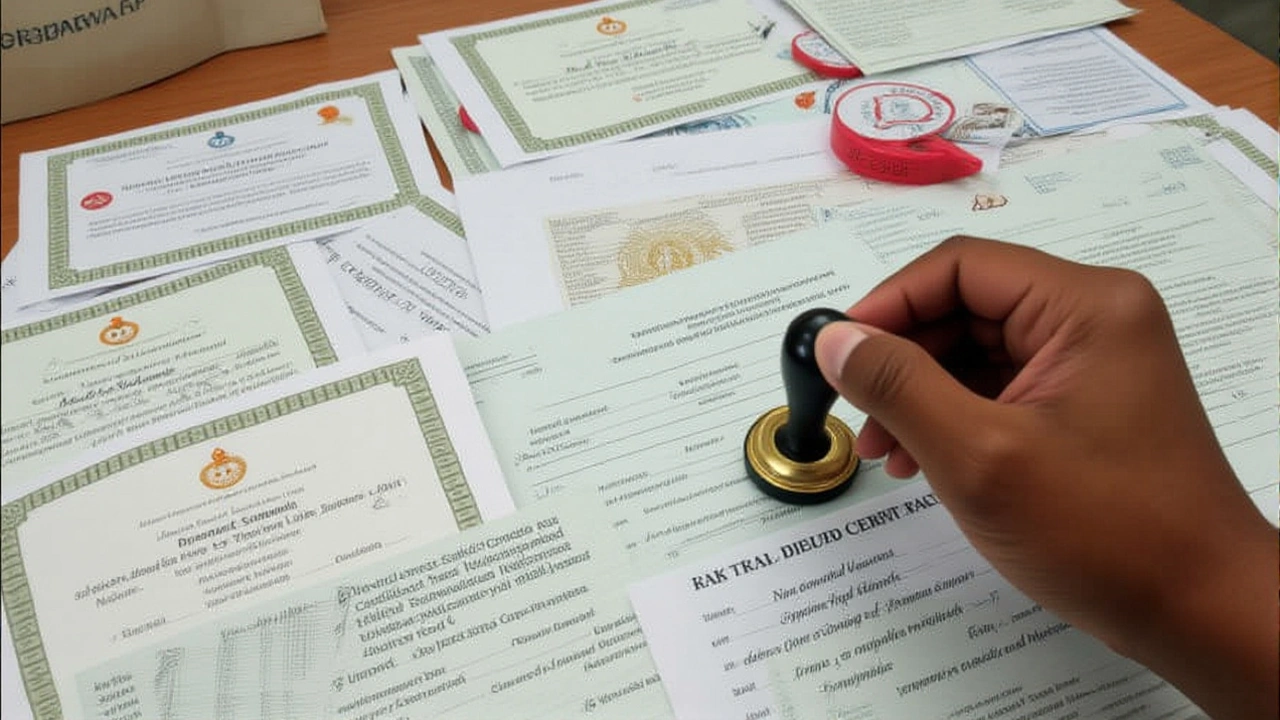Nigeria's Federal Government Sets Oct 6 Deadline to Eradicate Fake Certificates

When the Federal Government of Nigeria announced a sweeping crackdown on fake certificates, the entire public‑service landscape stopped in its tracks. Starting , every ministry, agency, and higher‑learning institution must run staff qualifications through a brand‑new digital platform. The move, driven by a directive signed by George Akume, Secretary to the Government of the Federation, promises to make forged degrees a thing of the past.
Why Nigeria Needed a Hard‑Line Policy
For years, employers across Lagos, Abuja, and the wider federation have grappled with résumés featuring degrees from "diploma mills" – institutions that exist only on paper. A 2023 survey by the National Universities Commission (NUC) found that 12 % of newly hired university staff could not produce verifiable credentials. The fallout isn’t just administrative; it erodes public trust and threatens national security when unqualified professionals occupy critical roles.
"Our education system is a cornerstone of development," said Tunji Alausa, Minister of Education during the March 2025 launch of the verification platform. "If we can’t trust what’s on a CV, we can’t trust the services that follow."
Inside the National Credential Verification Service (NCVS)
The National Credential Verification Service (NCVS) is the digital engine behind the reform. Built into the broader National Education Repository and Databank (NERD), the system assigns each authentic certificate a unique National Credential Number (NCN) and a set of security codes. Think of it as a passport for a degree – once verified, the credential can be “checked” with a single click at ned.gov.ng/onboarding.
Under the hood, NCVS links the fragmented records of the NUC, the National Board for Technical Education (NBTE), the National Commission for Colleges of Education (NCCE), the National Library, and the Nigeria Data Protection Commission. This multi‑agency council guarantees that data stays secure while remaining accessible for legitimate checks.
The Implementation Timeline
- March 2025: Platform officially launched by Minister Alausa after Federal Executive Council approval.
- April–June 2025: All public ministries and universities conduct pilot verifications; onboarding webinars hosted by NERD.
- July 2025: Private sector institutions receive mandatory enrollment instructions.
- October 6 2025: Deadline for every existing staff member and new hire to obtain NCVS clearance before appointment letters are signed.
Failure to comply after the cut‑off date will result in the automatic nullification of any pending appointment, and employers could face penalties up to ₦500,000 per violation.
Official Reactions and Early Feedback
"By October 6, fake degrees will no longer slip through the cracks," emphasized Haula Galadima, Executive Director for Communication and Cybersecurity at NERD. "Every credential presented in Nigeria must be verifiable at the click of a button."
University Vice‑Chancellors across the country have mostly welcomed the initiative, noting that it levels the playing field for genuine scholars. However, some private colleges warned of the short transition period, urging the government for additional technical support.
Potential Impact on Nigeria’s Global Standing
International partners, including the British Council and UNESCO, have praised the move as a model for other African nations wrestling with credential fraud. If successful, Nigeria could see a rise in foreign university collaborations and a smoother migration of skilled workers.
Economists also project a modest boost to public‑sector efficiency. A World Bank brief estimates that reducing fraudulent hires could save the government roughly ₦3 billion annually in salary overruns and procurement mishaps.
What Comes Next?
Post‑deadline, NERD will publish quarterly compliance reports, and the NCVS dashboard will become publicly viewable, allowing employers to verify credentials in real time. The government has hinted at extending the system to professional licensing bodies – think doctors, engineers, and pilots – within the next two years.
For now, the focus remains on full enrollment. Institutions are urged to appoint a “Focal Person” and a “Records Officer” by the end of September to avoid last‑minute bottlenecks.
Frequently Asked Questions
Who must verify their credentials by October 6, 2025?
All current and prospective employees of Nigeria’s ministries, departments, agencies, and both public and private higher‑learning institutions must obtain clearance from the National Credential Verification Service before any appointment can be finalized.
What happens if an institution fails to meet the deadline?
Appointments without NCVS clearance will be considered null and void. Additionally, the institution may face administrative sanctions, including fines up to ₦500,000 per non‑compliant staff member.
How does the NCVS ensure data security?
The service operates under the oversight of the Nigeria Data Protection Commission, employing encryption, role‑based access controls, and regular audits to safeguard personal and academic data.
Will the verification system affect foreign degrees?
Yes. Foreign qualifications must be authenticated through the NCVS as well, using the credential‑verification channels set up with partner verification bodies abroad.
What support is available for institutions during onboarding?
NERD has rolled out a series of webinars, a 24/7 help‑desk, and step‑by‑step guides on its website. Institutions are encouraged to appoint a dedicated Focal Person to liaise directly with the platform team.






Kiran Singh
September 30, 2025 AT 17:44Great move by the government – the October 6 deadline gives everyone a clear line in the sand for credential verification. 🎯 It’s going to push ministries and universities to clean up those shady diploma‑mill résumés once and for all. The new NCVS platform sounds user‑friendly enough; a single click to check a degree is a massive efficiency boost. 👍 I’m hopeful this will raise public trust and cut down on those weird hiring scandals we keep hearing about. Let’s keep the momentum going!
Balaji Srinivasan
October 10, 2025 AT 17:44This rollout is definitely a step in the right direction. The integration of NUC, NBTE, and NCCE data should make the verification smoother. I think the six‑month window for private institutions is reasonable if they get the right technical help.
Hariprasath P
October 20, 2025 AT 17:44lol, finally the gov is doing something about the fake degree circus. ur gonna see a lot of ppl scrambling to prove they ain’t just bragging on a piece of paper. hope the system isn’t just another bureaucratic nightmare, tho.
Vibhor Jain
October 30, 2025 AT 16:44Looks like bureaucracy finally got its syllabus.
vikash kumar
November 9, 2025 AT 16:44The introduction of a National Credential Number is a sophisticated solution that mirrors best practices in global education governance. By assigning a unique identifier to each authentic certificate, the system eliminates ambiguity that plagued manual verification. Moreover, the multi‑agency oversight involving the Data Protection Commission assures compliance with privacy standards. This convergence of data streams will likely facilitate cross‑border credential recognition, strengthening Nigeria’s academic reputation. The projected savings of ₦3 billion annually underscores the fiscal prudence of this initiative.
Anurag Narayan Rai
November 19, 2025 AT 16:44When you look at the broader implications of the NCVS, you realize it’s not merely an administrative tweak but a transformative overhaul of how competence is validated in the public sector. First, the platform centralizes disparate records from the NUC, NBTE, NCCE, and even the Library, creating a single source of truth that eliminates redundant checks. Second, by mandating that every current and prospective employee undergo this verification, the policy closes a loophole that has allowed unqualified individuals to infiltrate critical roles for years. Third, the digital nature of the system introduces auditability; every verification event is logged, making it possible to trace who approved which credential and when. Fourth, the enforcement mechanism-nullifying appointments and imposing fines up to ₦500,000-provides a strong deterrent against non‑compliance, ensuring that institutions take the process seriously. Fifth, the public transparency of quarterly compliance reports will empower civil society and watchdog groups to hold ministries accountable. Sixth, the integration with foreign verification bodies paves the way for smoother recognition of international qualifications, which could attract more diaspora talent back home. Seventh, the anticipated reduction in fraudulent hires is expected to free up billions in public funds, allowing those resources to be redirected toward genuine development projects. Eighth, the system’s architecture, built on encryption and role‑based access controls overseen by the Data Protection Commission, safeguards personal data while ensuring accessibility for legitimate checks. Ninth, the projected ripple effect on private sector hiring practices could standardize credential verification across the entire economy. Tenth, the move sets a precedent for other African nations grappling with diploma‑mill issues, potentially positioning Nigeria as a regional leader in educational integrity. Eleventh, the platform’s scalability means that within a few years it could be extended to professional licensing for doctors, engineers, and pilots, further tightening standards across high‑stakes professions. Twelfth, the requirement for institutions to appoint focal persons by the end of September introduces clear responsibility lines, reducing bureaucratic inertia. Thirteenth, the ongoing webinars and 24/7 help‑desk reflect a commitment to capacity building, which is essential for successful adoption. Fourteenth, the involvement of international partners like the British Council and UNESCO adds credibility and may bring additional resources or expertise. Fifteenth, this comprehensive approach reflects an understanding that credential fraud is not a peripheral issue but a systemic risk to governance and public trust. Finally, the holistic design of NCVS-combining technology, policy, enforcement, and stakeholder engagement-offers a robust template for future reforms in other sectors.
Sandhya Mohan
November 29, 2025 AT 16:44In the grand tapestry of nation‑building, the threads of honesty and merit must be woven tightly. The NCVS initiative reminds us that a society’s strength lies in the authentic achievements of its people, not in the shadows of counterfeit accolades. By demanding verification, we honor the true scholars who have toiled for their degrees. Let us view this as a philosophical alignment with truth itself.
Prakash Dwivedi
December 9, 2025 AT 16:44The rollout looks impressive on paper, yet I can’t help but sense a potential bottleneck in the onboarding phase. If institutions don’t allocate enough IT resources, the deadline could become a nightmare for many. Still, the idea of a single click verification is a welcome simplification.
Rajbir Singh
December 19, 2025 AT 16:44This policy is a clear signal that fake degrees won’t be tolerated. It forces everyone to be honest about their qualifications. The penalties make sure institutions take it seriously. It’s a good balance between enforcement and support.
Swetha Brungi
December 29, 2025 AT 16:44One might wonder how this will affect the morale of staff who have always been diligent about their credentials. Will the new system inadvertently stigmatize those whose records are older or less digitized? It could be an opportunity to modernize archival processes, though. Ultimately, the success will hinge on clear communication and adequate support for all institutions.
Govind Kumar
January 8, 2026 AT 16:44From a procedural standpoint, the timeline seems well‑structured, giving ministries and universities sufficient periods for pilot testing before full implementation. The requirement for a focal person ensures accountability at the institutional level. Additionally, the involvement of the Data Protection Commission adds a necessary layer of privacy oversight. I anticipate that, if executed correctly, the initiative will enhance both efficiency and public confidence.
Shubham Abhang
January 18, 2026 AT 16:44Now, we have a system, it's good-really good, absolutely, brilliant, but-there's always the question of-whether the staff in the rural areas can actually get into the system; the internet is not always stable, and the training-sessions may be-insufficient, leading to possible delays-, which could cause frustrat-ion among the personnel who are just trying to comply.
Trupti Jain
January 28, 2026 AT 16:44Well, this is a fancy new gadget for the bureaucracy-bright and shiny. I hope it doesn’t just become another paper‑chasing circus.
Priya Patil
February 7, 2026 AT 16:44Supporting this move feels right-clarity in hiring is essential for fairness. The penalty structure should ensure compliance without being overly punitive. Let’s hope the help‑desk can handle the influx of queries.
Maneesh Rajput Thakur
February 17, 2026 AT 16:44Everyone’s talking about the NCVS as a silver bullet, but what about the hidden agendas? Some think foreign agencies are using this to control our education system. While transparency is good, we must stay vigilant about data sovereignty. The fines could also be a revenue stream for hidden interests. I’d keep an eye on how the system evolves.